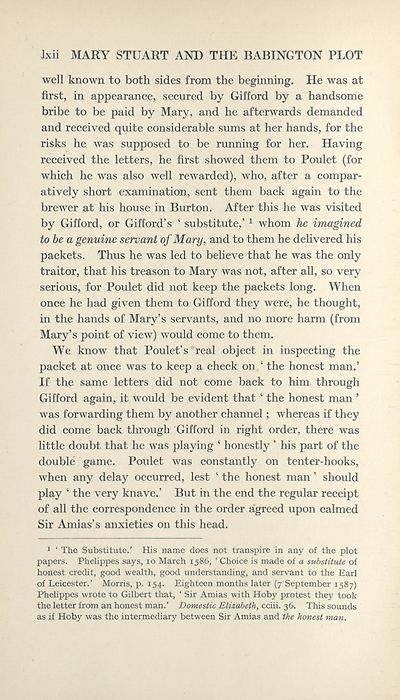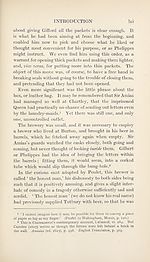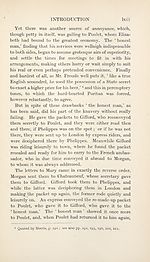Series 3 > Mary Queen of Scots and the Babington plot
(67) Page lxii
Download files
Complete book:
Individual page:
Thumbnail gallery: Grid view | List view

Jxii MARY STUART AND THE BABINGTON PLOT
well known to both sides from the beginning. He was at
first, in appearance, secured by Gifford by a handsome
bribe to be paid by Mary, and he afterwards demanded
and received quite considerable sums at her hands, for the
risks he was supposed to be running for her. Having
received the letters, he first showed them to Poulet (for
which he was also well rewarded), who, after a compar¬
atively short examination, sent them back again to the
brewer at his house in Burton. After this he was visited
by Gifford, or Gifford’s ‘ substitute,’ 1 whom he imagined
to he a genuine servant of Mary, and to them he delivered his
packets. Thus he was led to believe that he was the only
traitor, that his treason to Mary was not, after all, so very
serious, for Poulet did not keep the packets long. When
once he had given them to Gifford they were, he thought,
in the hands of Mary’s servants, and no more harm (from
Mary’s point of view) would come to them.
We know that Poulet’s real object in inspecting the
packet at once was to keep a check on ‘ the honest man.’
If the same letters did not come back to him through
Gifford again, it would be evident that ‘ the honest man ’
was forwarding them by another channel; whereas if they
did come back through Gifford in right order, there was
little doubt that he was playing ‘ honestly ’ his part of the
double game. Poulet was constantly on tenter-hooks,
when any delay occurred, lest ‘ the honest man ’ should
play ‘ the very knave.’ But in the end the regular receipt
of all the correspondence in the order agreed upon calmed
Sir Amias’s anxieties on this head.
1 ‘ The Substitute.’ His name does not transpire in any of the plot
papers. Phelippes says, 10 March 1586, ‘ Choice is made of a substitute of
honest credit, good wealth, good understanding, and servant to the Earl
of Leicester.' Morris, p. 154. Eighteen months later (7 September 1587)
Phelippes wrote to Gilbert that, ‘ Sir Amias with Hoby protest they took
the letter from an honest man.' Domestic Elizabeth, cciii. 36. This sounds
as if Hoby was the intermediary between Sir Amias and the honest man.
well known to both sides from the beginning. He was at
first, in appearance, secured by Gifford by a handsome
bribe to be paid by Mary, and he afterwards demanded
and received quite considerable sums at her hands, for the
risks he was supposed to be running for her. Having
received the letters, he first showed them to Poulet (for
which he was also well rewarded), who, after a compar¬
atively short examination, sent them back again to the
brewer at his house in Burton. After this he was visited
by Gifford, or Gifford’s ‘ substitute,’ 1 whom he imagined
to he a genuine servant of Mary, and to them he delivered his
packets. Thus he was led to believe that he was the only
traitor, that his treason to Mary was not, after all, so very
serious, for Poulet did not keep the packets long. When
once he had given them to Gifford they were, he thought,
in the hands of Mary’s servants, and no more harm (from
Mary’s point of view) would come to them.
We know that Poulet’s real object in inspecting the
packet at once was to keep a check on ‘ the honest man.’
If the same letters did not come back to him through
Gifford again, it would be evident that ‘ the honest man ’
was forwarding them by another channel; whereas if they
did come back through Gifford in right order, there was
little doubt that he was playing ‘ honestly ’ his part of the
double game. Poulet was constantly on tenter-hooks,
when any delay occurred, lest ‘ the honest man ’ should
play ‘ the very knave.’ But in the end the regular receipt
of all the correspondence in the order agreed upon calmed
Sir Amias’s anxieties on this head.
1 ‘ The Substitute.’ His name does not transpire in any of the plot
papers. Phelippes says, 10 March 1586, ‘ Choice is made of a substitute of
honest credit, good wealth, good understanding, and servant to the Earl
of Leicester.' Morris, p. 154. Eighteen months later (7 September 1587)
Phelippes wrote to Gilbert that, ‘ Sir Amias with Hoby protest they took
the letter from an honest man.' Domestic Elizabeth, cciii. 36. This sounds
as if Hoby was the intermediary between Sir Amias and the honest man.
Set display mode to:
![]() Universal Viewer |
Universal Viewer | ![]() Mirador |
Large image | Transcription
Mirador |
Large image | Transcription
Images and transcriptions on this page, including medium image downloads, may be used under the Creative Commons Attribution 4.0 International Licence unless otherwise stated. ![]()
| Scottish History Society volumes > Series 3 > Mary Queen of Scots and the Babington plot > (67) Page lxii |
|---|
| Permanent URL | https://digital.nls.uk/127234845 |
|---|
| Attribution and copyright: |
|
|---|
| Description | Over 180 volumes, published by the Scottish History Society, containing original sources on Scotland's history and people. With a wide range of subjects, the books collectively cover all periods from the 12th to 20th centuries, and reflect changing trends in Scottish history. Sources are accompanied by scholarly interpretation, references and bibliographies. Volumes are usually published annually, and more digitised volumes will be added as they become available. |
|---|


